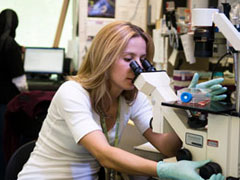Promise and Perseverance
By Jim Oldfield
Tall, blonde and perched on a stool at the end of a lab bay, Jelena Tomic collects B-cell and Interferon-laced serum from a tissue culture plate through a glass pipette, dripping it into rack-suspended vials. Later, she’ll do a Western Blot protein analysis on the cells to glean, she hopes, another bit of experimental evidence on why Interferon, an immunostimulatory agent, works sporadically as a vaccine adjuvant in leukemia.
Tomic at work is a familiar sight in Sunnybrook Research Institute’s S wing, and her dedication is paying off. A fourth-year PhD student in the molecular and cellular biology lab of senior scientist Dr. David Spaner, Tomic recently showed that Interferon, which normally activates the transcription factor STAT1 to suppress tumour growth, actually activates STAT3 in some leukemias, encouraging cell growth and division. She also discovered that Resveratrol, a compound naturally occurring in red grapes (and wine), can shut off STAT3 activation in leukemia cells while preserving the activation of STAT1. “These are important findings,” says Spaner, who is also a clinician. “We hope they’ll result in a treatment for leukemia that will help the patient's own immune system control the disease, and that might also be effective in other types of cancer.”
The work is so promising that the National Cancer Institute of Canada awarded Tomic the prestigious 2008 Harold E. Johns Studentship Award. A 16-member committee ranked Tomic’s application first of 59 submitted from across Canada. The ranking was based on the quality of her proposal, her journal publications and her marks. The $2,500 award, in turn, was based on the ranking and an interview, which for Tomic began as a nervous question-and-answer session in Montréal with Dr. Claude Perrault, Canada Research Chair in Immunobiology, but became what she’s wanted for years: a chance to present her work in person at Canada’s most important cancer funding agency—in a passionate two-way conversation. It lasted one-and-a-half hours. “I truly love what I do, and this award really means a lot to me,” says Tomic.
Spaner says Tomic could not have won the award or achieved such lab results without keen intellect and hard work, but he also believes she has a rare capacity for perseverance in the face of obstacles. Tomic came to Canada in the early '90s as a young refugee from the Bosnian War with next to nothing. “Perhaps because of the obstacles she has already overcome,” Spaner says, “she’s not fazed when experimental results don't turn out like we thought they would.” (And, as Spaner notes, that happens a lot in research.) “Jelena’s ability to keep going, together with her intelligence and enthusiasm, are likely to make her an important member of Canada's next generation of scientists,” he says.
PDF / View full media release »





